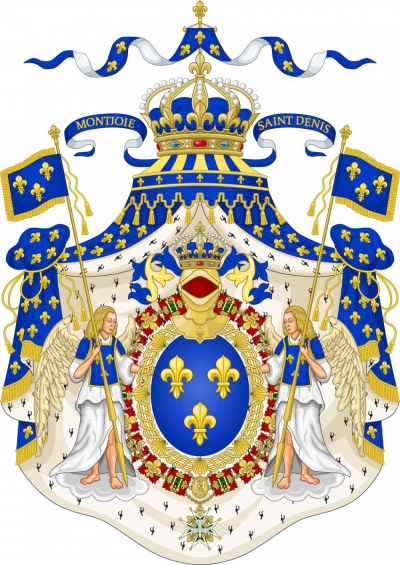The Battle of Carpi was a series of manoeuvres in the summer of 1701, and the first battle of the War of the Spanish Succession that took place on 9 July 1701 between France and Austria. It was a minor skirmish that the French commander decided was not worth fighting, but his soldiers were displeased at his decision to retreat, and he was subsequently replaced.
The House of Bourbon (English: , also UK: ; French: [buʁbɔ̃]) is a European dynasty of French origin, a branch of the Capetian dynasty, the royal House of France. Bourbon kings first ruled France and Navarre in the 16th century. By the 18th century, members of the Spanish Bourbon dynasty held thrones in Spain, Naples, Sicily, and Parma. Spain and Luxembourg have monarchs of the House of Bourbon.
The royal Bourbons originated in 1272, when the youngest son of King Louis IX married the heiress of the lordship of Bourbon. The house continued for three centuries as a cadet branch, serving as nobles under the Direct Capetian and Valois kings.
The senior line of the House of Bourbon became extinct in the male line in 1527 with the death of Charles III, Duke of Bourbon. This made the junior Bourbon-Vendôme branch the genealogically senior branch of the House of Bourbon. In 1589, at the death of Henry III of France, the House of Valois became extinct in the male line. Under the Salic law, the head of the house of Bourbon, as the senior representative of the senior-surviving branch of the Capetian dynasty, became King of France as Henry IV. Bourbon monarchs then united to France the small kingdom of Navarre, which Henry's father had acquired by marriage in 1555, ruling both until the 1792 overthrow of the monarchy during the French Revolution. Restored briefly in 1814 and definitively in 1815 after the fall of the First French Empire, the senior line of the Bourbons was finally overthrown in the July Revolution of 1830. A cadet Bourbon branch, the House of Orléans, then ruled for 18 years (1830–1848), until it too was overthrown.
The Princes of Condé was a cadet branch of the Bourbons descended from an uncle of Henry IV, and the Princes of Conti was a cadet line of the Condé branch. Both houses, recognised as princes of the blood, were prominent French noble families, well known for their participation in French affairs, even during exile in the French Revolution, until their respective extinctions in 1830 and 1814. Since the extinction of the Capetian House of Courtenay in 1733, the Bourbons are the only surviving branch of the House of Capet.
In 1700, at the death of Charles II of Spain, the Spanish Habsburgs became extinct in the male line. Under the will of the childless Charles II, the second grandson of Louis XIV of France was named as his successor, to preclude the union of the thrones of France and Spain. The prince, then Duke of Anjou, became Philip V of Spain. Permanent separation of the French and Spanish thrones was secured when France and Spain ratified Philip's renunciation, for himself and his descendants, of the French throne in the Treaty of Utrecht in 1714, and similar arrangements later kept the Spanish throne separate from those of the Two Sicilies and Parma. The Spanish House of Bourbon (rendered in Spanish as Borbón [boɾˈβon]) has been overthrown and restored several times, reigning 1700–1808, 1813–1868, 1875–1931, and since 1975. Bourbons ruled in Naples from 1734 to 1806 and in Sicily from 1735 to 1816, and in a unified Kingdom of the Two Sicilies from 1816 to 1860. They also ruled in Parma from 1731 to 1735, 1748–1802 and 1847–1859.
Charlotte, Grand Duchess of Luxembourg (ruled 1919–1964) married a cadet of the Parmese line and thus her successors, who have ruled Luxembourg since her abdication in 1964, have also been members of the House of Bourbon. Isabel, Princess Imperial of Brazil, regent for her father, Pedro II of the Empire of Brazil, married a cadet of the Orléans line and thus their descendants, known as the Orléans-Braganza, were in the line of succession to the Brazilian throne and expected to ascend its throne had the monarchy not been abolished by a coup in 1889.
All legitimate, living members of the House of Bourbon, including its cadet branches, are direct agnatic descendants of Henry IV through his son Louis XIII of France.

1701Jul, 9
A Bourbon force under Nicolas Catinat withdraws from a smaller Habsburg force under Prince Eugene of Savoy in the Battle of Carpi.
Choose Another Date
Events on 1701
- 23May
William Kidd
After being convicted of piracy and of murdering William Moore, Captain William Kidd is hanged in London. - 9Jul
Battle of Carpi
A Bourbon force under Nicolas Catinat withdraws from a smaller Habsburg force under Prince Eugene of Savoy in the Battle of Carpi. - 19Jul
Nanfan Treaty
Representatives of the Iroquois Confederacy sign the Nanfan Treaty, ceding a large territory north of the Ohio River to England.

 English
English  español
español  français
français  português
português  русский
русский  العربية
العربية  简体中文
简体中文 